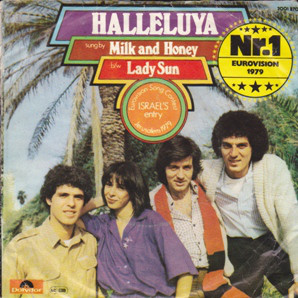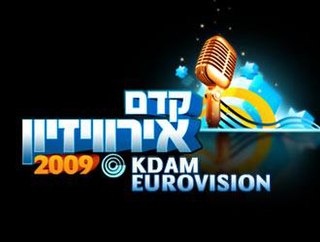
The Eurovision Song Contest 1993 was the 38th edition of the Eurovision Song Contest, held on 15 May 1993 at the Green Glens Arena in Millstreet, Ireland. Organised by the European Broadcasting Union (EBU) and host broadcaster Radio Telefís Éireann (RTÉ), and presented by Fionnuala Sweeney, the contest was held in Ireland following the country's victory at the 1992 contest with the song "Why Me?" performed by Linda Martin.

Israel has participated in the Eurovision Song Contest 45 times since making its debut in 1973. Israel was able to enter the contest as the Israel Broadcasting Authority (IBA) was an active member of the European Broadcasting Union (EBU), which was responsible for the event. In 2017, the IBA was succeeded as national broadcaster by the Israeli Public Broadcasting Corporation (IPBC/Kan), which took charge of the country's entry the following year. Israel has won the contest four times, and has hosted the contest in Jerusalem in 1979 and 1999, and in Tel Aviv in 2019.
Israel participated in the Eurovision Song Contest 2006 with the song "Together We Are One" written by Orly Burg, Osnat Zabag and Eddie Butler. The song was performed by Eddie Butler, who had previously represented Israel in the Eurovision Song Contest in 1999 as part of the band Eden where they placed fifth with the song "Yom Huledet". The Israeli entry for the 2006 contest in Athens, Greece was selected through the national final Kdam Eurovision 2006, organised by the Israeli broadcaster Israel Broadcasting Authority (IBA). The competition took place on 15 March 2006 and featured eleven entries. "Ze Hazman" performed by Eddie Butler emerged as the winner after achieving the highest score following the combination of votes from four regional juries and a public vote. The song title was later translated from Hebrew to English for the Eurovision Song Contest and was titled "Together We Are One".

"Hallelujah" is a song recorded by Israeli band Milk and Honey with music composed by Kobi Oshrat and Hebrew lyrics written by Shimrit Orr. It represented Israel in the Eurovision Song Contest 1979 held in Jerusalem, winning the contest.
Israel participated in the Eurovision Song Contest 2005 with the song "HaSheket SheNish'ar" written by Pini Aaronbayev, Eyal Shachar and Ben Green. The song was performed by Shiri Maimon. The Israeli entry for the 2005 contest in Kyiv, Ukraine was selected through the national final Kdam Eurovision 2005, organised by the Israeli broadcaster Israel Broadcasting Authority (IBA). The competition took place on 2 March 2005 and featured fourteen entries. "HaSheket SheNish'ar" performed by Shiri Maimon emerged as the winner after gaining the most points following the combination of votes from five regional juries and a regional televote.

The Kdam Eurovision in short known as the Kdam was the Israeli national preselection of the Eurovision Song Contest. The competition was first introduced in 1981 and ran until 2014.
Israel participated in the Eurovision Song Contest 2008 with the song "The Fire in Your Eyes" written by Dana International and Shay Kerem. The song was performed by Boaz Ma'uda, who was internally selected by the Israeli broadcaster Israel Broadcasting Authority (IBA) in collaboration with the commercial broadcaster Keshet in November 2007 to compete at the 2008 contest in Belgrade, Serbia, The song Ma'uda would perform at Eurovision was selected through the national final Kdam Eurovision 2008 which took place on 15 March 2010 that featured five songs. "Ke'ilu Kan" emerged as the winning song after achieving the highest score following the combination of votes from two regional juries, two thematical jury groups, a jury panel and a public vote. The song title was later translated from Hebrew to English for the Eurovision Song Contest and was titled "The Fire in Your Eyes".
Ireland was the host country of the Eurovision Song Contest 1993, held in Millstreet's Green Glens Arena, after Linda Martin won the 1992 Contest with "Why Me?". Radió Telfís Éireann (RTÉ) held a national final to select the Irish entry for the contest, which was won by Niamh Kavanagh and the song "In Your Eyes".
Israel participated in the Eurovision Song Contest 2009 with the song "There Must Be Another Way" written by Noa, Mira Awad and Gil Dor. The song was performed by Noa and Mira Awad, who were internally selected by the Israeli broadcaster Israel Broadcasting Authority (IBA) in January 2009 to compete at the 2009 contest in Moscow, Russia. The song Noa and Awad would perform at Eurovision was selected through the national final Kdam Eurovision 2009 which took place on 2 March 2009 that featured four songs. "Einaiych " emerged as the winning song after achieving the highest score following the combination of votes from two regional juries, a jury panel and a public vote.
Belgium was represented by Barbara Dex at the Eurovision Song Contest 1993, which took place in Millstreet, Ireland, performing "Iemand als jij". Dex was the winner of the Flemish national final for the contest, Eurosong '93.
Israel participated in the Eurovision Song Contest 2010 with the song "Milim" written by Tomer Hadadi and Noam Horev. The song was performed by Harel Skaat, who was internally selected by the Israeli broadcaster Israel Broadcasting Authority (IBA) in collaboration with the commercial broadcaster Reshet in December 2009 to compete at the 2010 contest in Oslo, Norway. The song Skaat would perform at Eurovision was selected through the national final Kdam Eurovision 2010 which took place on 15 March 2010 that featured four songs. "Milim" emerged as the winning song after achieving the highest score following the combination of votes from four thematical jury groups, a jury panel and a public vote.
Lehakat Shiru was the Israeli band that represented Israel in the Eurovision Song Contest 1993 held in Millstreet, Ireland. They performed the song "Shiru". They finished in 24th place with a total of 4 points. The group consisted of Sarah'le Sharon, Benny Nadler, Guy Bracha, Julia Proiter and Rachel Haim. They were accompanied on stage by a backing singer, Varda Zamir.
Norway was represented by 16-year-old Silje Vige, with the song "Alle mine tankar", at the 1993 Eurovision Song Contest, which took place on 15 May in Millstreet, Ireland. "Alle mine tankar" was chosen as the Norwegian entry at the Melodi Grand Prix on 6 March.
Israel participated in the Eurovision Song Contest 2011 with the song "Ding Dong" written and performed by Dana International, who had previously represented Israel in the Eurovision Song Contest in 1998 where she won the contest with the song "Diva". The Israeli entry for the 2011 contest in Düsseldorf, Germany was selected through the national final Kdam Eurovision 2011, organised by the Israeli broadcaster Israel Broadcasting Authority (IBA). The competition took place on 8 March 2011 that featured ten entries. "Ding Dong" performed by Dana International emerged as the winner after achieving the highest score following the combination of votes from three thematical jury groups, a twelve-member jury panel and a public vote.
Israel participated in the Eurovision Song Contest 2015 with the song "Golden Boy", written by Doron Madali. The song was performed by Nadav Guedj. Israeli broadcaster Israel Broadcasting Authority (IBA) collaborated with the commercial broadcaster Keshet in order to select the Israeli entry for the 2015 contest in Vienna, Austria. The reality singing competition HaKokhav HaBa, which was organised by Keshet, was used to select the artist that would represent Israel. Nadav Guedj emerged as the winner of the competition in a final that took place in February 2015. The song "Golden Boy" was later internally selected as the song Guedj would perform at Eurovision and was presented to the public in March 2015.
Israel participated in and won the 1978 Eurovision Song Contest, held on 22 April 1978 in Paris, France. It marked Israel's first win at the contest and the first win for a country outside of continental Europe. The winning song was "A-Ba-Ni-Bi," composed by Nurit Hirsh, written by Ehud Manor, and performed by Izhar Cohen and the Alphabeta.
Israel participated in the Eurovision Song Contest 2016 with the song "Made of Stars" written by Doron Medalie. The song was performed by Hovi Star. Israeli broadcaster Israel Broadcasting Authority (IBA) collaborated with the commercial broadcaster Keshet in order to select the Israeli entry for the 2016 contest in Stockholm, Sweden. The reality singing competition HaKokhav HaBa L'Eirovizion, which was organised by Keshet and Tedy Productions, was used to select the Israeli entry. The fifteen show competition concluded with a final on 3 March 2016 that featured four performers who were matched with potential Eurovision songs. "Made of Stars" performed by Hovi Star emerged as the winner following a public vote.
Israel participated in the Eurovision Song Contest 2017. Israeli broadcaster Israel Broadcasting Authority (IBA) collaborated with the commercial broadcaster Keshet and Tedy Productions which organised the reality singing competition HaKokhav HaBa L'Eurovizion to select the singer. The winner of the Israeli national selection was Imri Ziv and a committee of the Israeli broadcaster internally selected for him the song "I Feel Alive" written by Dolev Ram and Penn Hazut. The song was presented to the public on 13 March 2017.
Portugal took part at the Eurovision Song Contest 1993 in Millstreet, Ireland, represented by Anabela with the song "A cidade ". Anabela was selected through the annual Festival da Canção, Portugal's Eurovision selection show, to represent the country at the contest in Ireland.
Israel participated in the Eurovision Song Contest 2002 with the song "Light a Candle" written by Svika Pick and Yoav Ginai. The song was performed by Sarit Hadad, who was internally selected by the Israeli broadcaster Israel Broadcasting Authority (IBA) in November 2001 to compete at the 2002 contest in Tallinn, Estonia. The song Hadad would perform at Eurovision, "Light a Candle", was also internally selected and presented to the public on 26 February 2002 during the Meni Peer Show which was broadcast on Channel 1.



